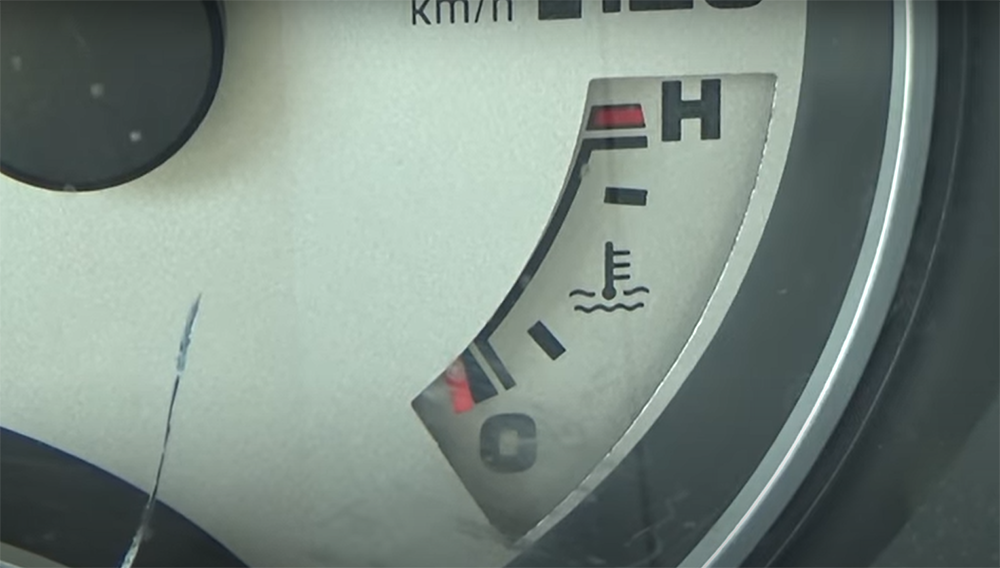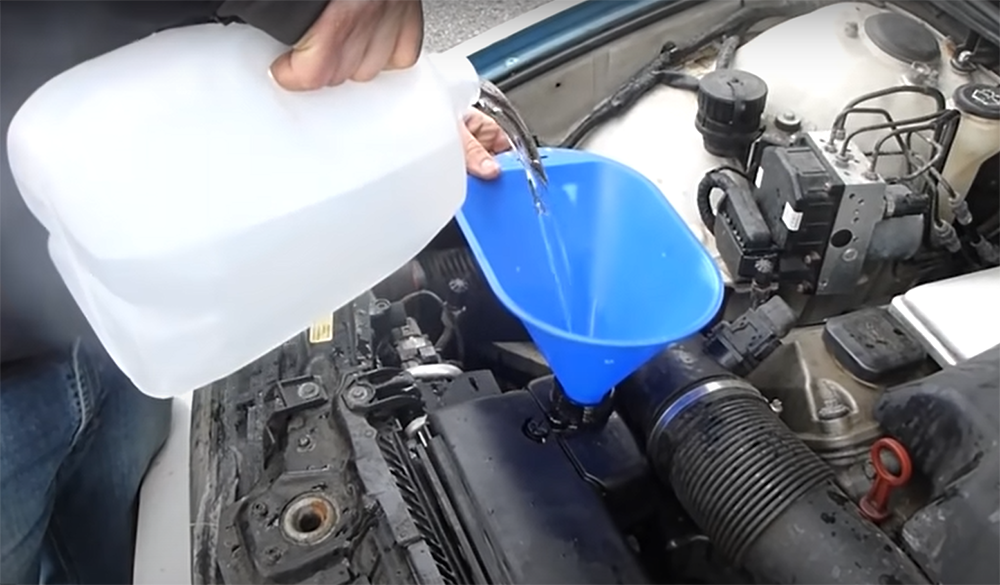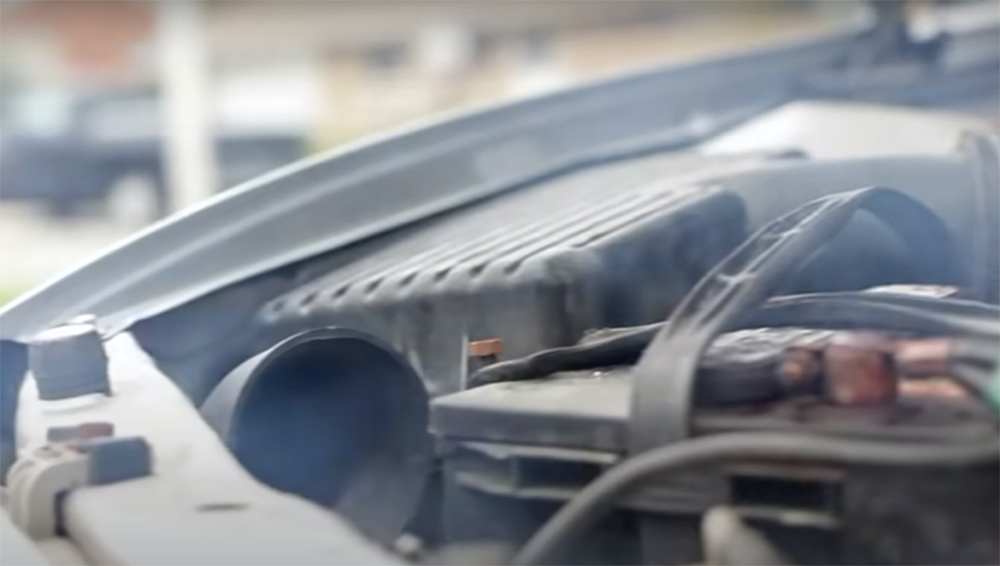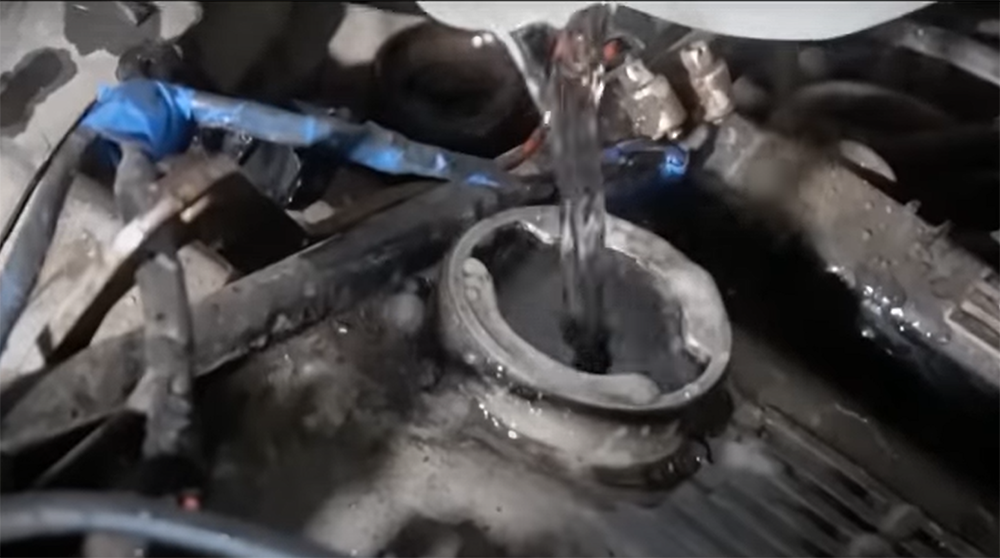It’s the dead of winter and you go out to start your car only to find out that the radiator is frozen. What do you do? In this blog post, we will walk you through the complete process of how to unfreeze a car radiator. We will provide step-by-step instructions on how to thaw out your car and get it up and running again. So, if you are stuck in a bind this winter, don’t worry! We’ve got you covered.
Signs and symptoms that your car radiator may be frozen include:
- The engine is overheating
- There is steam coming from under the hood
- The temperature gauge is in the red zone
- There is coolant leaking from the radiator
- The radiator cap is cracked or broken
- The radiator hoses are brittle or cracked

If you notice any of these signs, it’s important to take action immediately. If your car radiator is frozen, it could lead to serious engine damage. [1]
What to do next
1) Don’t drive the car
This will only make the problem worse and could cause irreparable damage to your engine. If you’re stranded, call a tow truck or a friend with a car to take you to a nearby service station.
2) Allow time to thaw
Turn off the engine and open the hood. Let the car sit until the ice melts. This could take a few hours, so be patient. You can speed up the process by using a hair dryer or a space heater, but be careful not to overheat the engine.
Once the radiator is thawed, flush it out with clean water and add fresh coolant before driving again.
If your car has been leaking coolant, there’s a good chance that there’s rust and debris in the system. In this case, it’s best to take it to a mechanic for a professional flush and checkup.
3) Before the winter comes, check your coolant levels
It’s a good idea to do this regularly, but it’s especially important before the winter months. Make sure your coolant is at the correct level and that there are no leaks in the system. You should also inspect the radiator cap to be sure it’s in good working order. [2]
Prevention
The best way to prevent your car radiator from freezing is to keep it filled with coolant. Check the level regularly and top it off as needed. You can also add an antifreeze solution to the coolant to help lower the freezing point.

In cold weather, park your car in a garage or under an umbrella when possible to protect it from the elements. And if you know you won’t be driving for a while, drain the radiator and add fresh coolant before storing your car for the winter.
If you take these steps, you can help prevent your car radiator from freezing in the first place. But if it does happen, now you know what to do. [3]
Put in the Antifreeze – One More Way to Unfreeze Your Radiator
Once you’ve added enough antifreeze, it’s time to fill up the radiator with water until it reaches the “Full” line on the overflow reservoir. If your car has been sitting for a while, you may need to bleed the air out of the cooling system. Consult your owner’s manual on how to do this properly. [4]
What will happen if the car does not have any antifreeze?
If your car does not have any antifreeze, the water in the radiator will freeze. The battery is too hot, causing the engine to overheat and destroy it. The best way to prevent this from happening is to add antifreeze to the radiator. The antifreeze will lower the freezing point of water, so it will not freeze as easily.
Is it possible to just add coolant to my automobile?

The answer is yes, but it’s not recommended. Adding coolant to your car will only temporarily fix the problem. The reason your radiator is frozen in the first place is that there isn’t enough coolant in the system. To permanently fix the problem, you’ll need to add more coolant to the system. This can be done by flushing out the old coolant and adding new coolant to the system. Flushing out the old coolant can be done at a repair shop or with a do-it-yourself kit. Adding new coolant to the system can also be done at a repair shop or with a do-it-yourself kit. If you choose to do it yourself, make sure you follow the instructions carefully. Adding too much or too little coolant can cause damage to your car.
How long can an engine function without coolant?
About 15 minutes. But it’s not recommended to drive your car without coolant. Doing so can damage your engine. If you must drive without coolant, do so for a short distance and at a low speed. Also, keep a close eye on your engine temperature gauge. If it starts to get too hot, turn off the engine and call a tow truck. [5]
What are some signs that my car’s radiator needs to be replaced?
There are several signs that your car’s radiator needs to be replaced. These include:
- Your car is leaking coolant
- Your car’s engine is overheating
- Your car’s radiator is cracked or damaged
- There is rust on your car’s radiator
If you notice any of these signs, take your car to a repair shop as soon as possible.
Is it possible to thaw frozen water with antifreeze?
The answer is yes. Antifreeze can be used to thaw frozen water. However, it’s important to use the proper ratio of antifreeze to water. Using too much antifreeze can damage your car.

To thaw frozen water with antifreeze, you’ll need to mix the two together in a container. Once you’ve mixed the two together, pour the mixture into your car’s radiator. Start the car and let it run for a few minutes. The heat from the engine will help thaw the frozen water.
Is it possible for frozen pipes to thaw on their own?
The answer is yes, but it depends on the severity of the freeze. If the pipe has only a small amount of ice in it, then the sun or warm air from a heater can thaw it out. But if the pipe is completely frozen solid, then you’ll need to take some active steps to unfreeze it. [7]
Effective Methods to Unfreeze a Car Radiator
When winter hits, a frozen car radiator can be a common issue. Use the table below for insights into different methods, necessary materials, precautions, and expert tips to unfreeze your car radiator effectively.
| Method | Necessary Materials | Precautions | Expert Tips |
|---|---|---|---|
| Warm Water | Bucket of warm water | Avoid using boiling water to prevent damage | Pour the warm water over the radiator to thaw the ice |
| Electric Blanket | Electric blanket or heating pad | Ensure the blanket is suitable for automotive use | Wrap the blanket around the radiator and let it warm up |
| Hair Dryer | Hair dryer with a high heat setting | Keep the dryer a safe distance from the radiator | Direct warm air over the radiator to melt the ice |
| Commercial Antifreeze | Commercial radiator antifreeze | Check for compatibility with your vehicle | Top up the radiator with antifreeze to prevent future freezing |
| Radiator Flush | Radiator flush solution | Follow manufacturer instructions for the flush | Flush the radiator to remove any ice buildup |
| Isopropyl Alcohol | Isopropyl alcohol mixed with water | Ensure the mixture is appropriate for your vehicle | Apply the solution on the frozen parts to melt the ice |
Explanation of the Table:
This table offers a detailed guide on unfreezing a car radiator. It includes various methods, necessary materials, precautions, and expert tips for each method. Safely thaw your car radiator and prevent further freezing with these effective techniques.
FAQ
Will antifreeze damage the cooling system?
The short answer is yes. But, it is not as simple as that. While antifreeze will protect your cooling system from freezing, it can also cause corrosion and other problems. That is why it is critical to use the proper antifreeze and to follow the manufacturer’s instructions.
Can I use water instead of antifreeze?
Yes, you can use water instead of antifreeze. However, water will not protect your cooling system from freezing and will need to be changed more often than antifreeze. Water alone in your cooling system is also hazardous. It leads to corrosion and other issues if used exclusively. Therefore, it is important to use the right type of antifreeze and to change it according to the manufacturer’s recommendations.
What is the best way to thaw a frozen radiator?
The best way to thaw a frozen radiator is to use a hairdryer. Simply aim the hairdryer at the frozen radiator and turn it on high. You should see the ice start to melt within minutes. If you do not have a hairdryer, you can also use a heat lamp or an infrared heater. Just be sure to keep the heat source at least six inches away from the radiator to prevent damage.
How can I prevent my car radiator from freezing?
There are several things you can do to prevent your car radiator from freezing:
- Use antifreeze. This will lower the freezing point of the water in your radiator, and help to prevent it from freezing.
- Keep your car clean. A dirty car is more likely to have problems with its cooling system, and this can lead to a frozen radiator.
- Check your coolant level regularly. If the coolant level gets too low, it can cause the radiator to freeze.
- Don’t let your car idle for too long. If you do need to let your car idle, make sure that you do so in a well-ventilated area.
If you follow these tips, you should be able to prevent your car radiator from freezing.
What should I do if my radiator is frozen?
If your radiator is frozen, you’ll need to take some steps to unfreeze it. First, turn off the engine and let the car cool down. Next, locate the radiator cap and remove it. Be careful when doing this, as there may be hot steam or coolant waiting to escape. Once the cap is off, check the level of the coolant. If it’s low, add more until it reaches the full line. Finally, start the engine and let it run for a few minutes before turning it off again. Repeat this process until the radiator is thawed out and functioning properly again.
What is the best way to restart a frozen engine?
There are a few ways that you can restart a frozen engine, but the best way is to use a car radiator. A car radiator is a device that helps to cool the engine by circulating coolant through the engine block.
If your car has been sitting for a while, or if it has been in cold weather, the chances are that your car’s radiator is frozen. Here are some tips on how to unfreeze a car radiator:
- Start by turning on the heater in your car to full blast. This will help to thaw out the engine and hopefully get it running again.
- If the above tip does not work, try pouring hot water over the radiator. Be careful not to pour too much, as this can damage the engine.
- If your car is still not running, you may need to call a tow truck or mechanic. This is usually the last resort, as it can be expensive.
How can you tell whether your engine is frozen?
There are a few signs that you can look for:
- If your car won’t start, it may be because the engine is frozen.
- If the engine is making strange noises, this may also be a sign that it is frozen.
- If the radiator is leaking, this could be another sign that the engine is frozen.
If you think that your engine might be frozen, it’s best to take it to a mechanic or tow truck company to have it checked out. They will be able to tell you for sure whether or not the engine is frozen and how to fix it.
Why is my car radiator frozen in the first place?
Car radiators can freeze due to low temperatures, insufficient antifreeze concentration, or a malfunction in the cooling system. Understanding the cause can help you address the issue effectively.
Can I use any type of antifreeze to unfreeze my car radiator?
No, it’s crucial to use the correct type of antifreeze recommended for your vehicle. Using the wrong antifreeze can lead to damage and may not effectively unfreeze the radiator. Check your vehicle’s manual for the recommended antifreeze type.
What steps should I take if I suspect my car radiator is frozen?
If you suspect your car radiator is frozen, turn off the engine immediately to prevent further damage. Allow the engine to cool down before attempting any unfreezing methods. Once cooled, follow the recommended steps to safely thaw the radiator and prevent damage.
Is it safe to pour hot water directly on a frozen radiator?
No, pouring hot water directly on a frozen radiator can cause thermal shock and damage the radiator. Instead, use lukewarm water or a radiator-specific thawing solution to gradually thaw the system. Patience is key to prevent further complications.
Can I use a hairdryer to unfreeze my car radiator?
Yes, a hairdryer can be a useful tool to unfreeze a car radiator. Use the lowest heat setting and keep the dryer at a safe distance to avoid overheating. Focus on the affected area and be patient as the heat gradually melts the ice.
What should I do if my car radiator remains frozen after attempting to thaw it?
If your initial attempts to unfreeze the radiator are unsuccessful, it’s advisable to seek professional help. Continuing to force the radiator may lead to further damage. A qualified mechanic can assess the situation and implement the necessary repairs.
Are there any preventive measures to avoid radiator freezing in the future?
Yes, regular maintenance and checking the antifreeze concentration are essential preventive measures. Ensure that the cooling system is in good condition, and the antifreeze level meets the manufacturer’s recommendations. This helps prevent freezing and ensures optimal engine performance during cold weather.
Useful Video: Frozen radiator fluid, Engine Cranking (Xsara Picasso)
Conclusion
Mechanics are available at most auto parts stores and many gas stations during business hours. Many of them will be happy to help you out or answer any questions you may have. You can also find helpful videos online if you prefer visual instructions. Whatever method you choose, make sure you follow the directions carefully so that you don’t damage your car’s radiator. With a little preventative maintenance, you can avoid the hassle of a frozen radiator altogether. So don’t wait until it’s too late, get your car winter-ready today!
Now that you know how to unfreeze a car radiator, you can keep your car running smoothly all winter long. Just be sure to check your radiator fluid level regularly and add antifreeze when needed. If you have any questions about how to unfreeze a car radiator, feel free to ask a mechanic or leave a comment below. Stay safe and warm this winter!
References:
- https://www.total911.com/what-to-do-if-your-car-freezes-this-winter/
- https://answers-to-all.com/language/how-do-you-unfreeze-a-radiator
- https://resource-center.meineke.com/dont-freeze-front-end/
- https://www.quora.com/If-my-radiator-has-ice-in-it-and-I-put-antifreeze-in-the-radiator-would-it-melt-the-ice
- https://www.quora.com/How-long-can-I-drive-a-car-with-no-coolant
- https://www.darcarskiaoffrederick.com/blogs/3404/top-5-signs-your-car-needs-a-radiator-repair-in-frederick-md/
- https://www.familyhandyman.com/article/signs-of-frozen-pipes/










Leave a Review